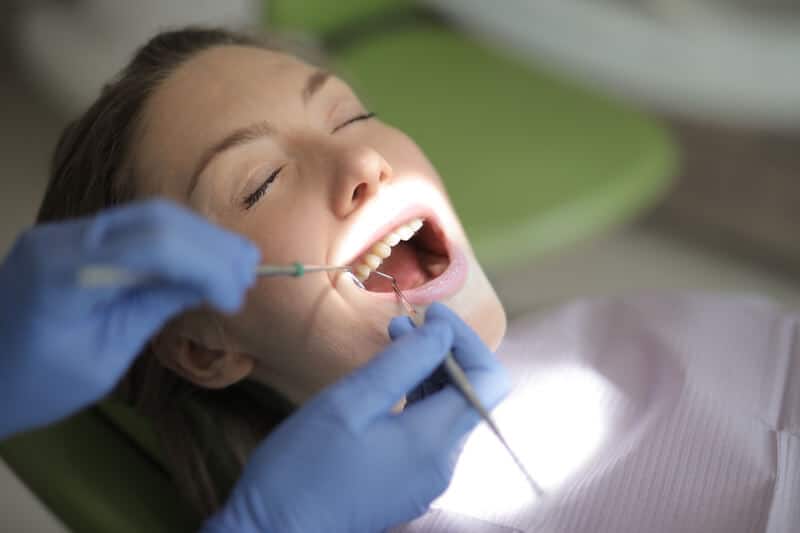
Toothache
What causes toothache & tooth nerve pain – plus useful temporary remedies, pain-relief & eliminating your pain!

Toothache is often a little bit like an iceberg; what you see at the top is only part of the picture, because it’s usually a sign that something harmful is going on nearby in your tooth or gums.
Toothache can be anything from a dull, aching or throbbing pain to sharp, severe nerve pain, commonly felt, for example, when you drink an ice-cold or boiling-hot beverage.
Sometimes, you may find that your toothache resolves on its own without seeing a dentist, but often, the problem will present again, giving you a not-so-gentle reminder that it’s time to see the dentist.
Smile assessment and resin bonding mockup
To ensure you’ll be happy with the result, first, we’ll get you in for a 40-minute smile assessment. Here, we’ll discuss any concerns you have with your teeth and how you’d like them improved.
Using resin bonding, we’ll mock up a temporary smile, which will last around 2 to 3 hours – just enough time for you to take a good look at the mirror, show your family and friends and be 100% certain that you’re happy with the look we’ve produced.
The procedure
The composite bonding procedure is completed in one session. We’ll use several colours to achieve a more natural-looking result. And, all composite veneers have a two-year guarantee.
What causes toothache?
There are several reasons for toothache. Here are some of the more common reasons…
Cracked/fractured tooth
Often, particularly with senior patients or those with silver/metallic fillings or large fillings after extensive repair work, a crack or fracture in the tooth can occur. This is even more common with ‘bruxers’ or tooth ‘clenchers’ as the constant tooth grinding can encourage a compromised tooth to crack. The tooth becomes more sensitive to chew on – and with temperature changes – resulting in a toothache. The best way to treat a fractured tooth is to see the dentist as soon as possible to stop the fracture enlarging.
Bruxism
If you’ve been involuntarily grinding or gnashing your teeth, this can wear down the enamel and make your teeth sensitive – and even fracture. Sometimes, bruxism can even cause crowns or fillings to become dislodged, which in turn, exposes the nerve, resulting in severe toothache.
Tooth impaction
Poorly aligned teeth may cause tooth impaction problems; however, wisdom teeth are the most common cause. Often, there is not enough room in the mouth the wisdom tooth to come through, which can irritate nearby nerves and cause pain.
Food or debris stuck in teeth
It may be surprising to know that food or debris stuck in teeth is a common cause of toothache, as food wedged between teeth can increase the pressure on the teeth, causing nerve pain. Therefore, if you see no apparent reason for having a toothache, make sure you brush and floss your teeth to make sure wedged debris is not the problem.
Sinus infection
postnasal drip from a sinus infection can cause tooth pain, so if you have sinusitis, you may need to see a doctor for antibiotics.
Tooth decay
One of the more common causes of toothache, tooth decay develops when bacteria wears away the enamel in your teeth. Eventually, this decay will reach your sensitive nerve endings in your underlying tooth structure (dentine), and, without treatment, can reach the middle of your tooth (pulp).
Gum disease
Another common dental problem, gum disease is caused by the acid in your mouth, causing plaque, which sits on the tooth and gums. The plaque that sits under your gums, near your tooth, can damage your tooth structure and tooth roots, which causes your tooth to become wobbly and ache.
Abscesses
An abscess is a pocket of pus caused by a bacterial infection – often from either tooth decay or gum disease. The absence can be either on the side of the tooth in the gum pocket (periodontal abscess) or at the tip of the tooth root (periapical abscess)
Trauma
If you’ve had a sporting accident or mishap at work and have chipped your tooth, this can expose the pulp – the middle of your tooth – to bacteria, which can cause a painful infection.
Losing a filling or crown
If a crown or filling has dislodged from your mouth, it could expose a nerve root, which may be extremely painful.
How to treat a toothache
If you are suffering from toothache, please call our dental clinic and discuss your condition with one of our dentists. They will then decide how soon you should visit our clinic. A severe toothache is often classified as a dental emergency and, therefore, should be treated as soon as possible.
While you wait to see the dentist, you can try the following remedies at home…
If it’s nighttime, pop your head up with pillows or cushions or elevate the head of the bed to help avoid the blood rushing to your head, which can exacerbate the pain and keep you awake.
Applying an ice pack or cold compress against your cheek – not directly to the tooth (which can exacerbate pain) can help numb the pain.
Create a saltwater solution of half a teaspoon of salt to a glass of warm water, then gargle around the painful area for at least five seconds.
Providing your pain is mild, simple pain relief medication such as aspirin can help to eliminate tooth pain quickly. Only swallow the aspirin and don’t apply to the gums as acid can burn the gum tissue.
Toothache can make you extremely temperature-sensitive, so avoid extremely hot or cold drinks – or foods – and stay away from hard-to-chew foods as all of these will may exacerbate a toothache.

Toothache FAQs
Occasionally, toothache will go away on its own, particularly if it is caused by food or debris stuck in the teeth or by short-term bruxism. However, most toothache is a sign that something unhealthy is happening with your tooth, and therefore you should always contact your dentist.
Toothache can feel like a dull, aching sensation or an extremely sharp, electric-like pain. Pain from a toothache can range from minor pain that only requires over-the-counter pain relief to severe toothache with throbbing tooth pain or swelling around your tooth or gum – that requires immediate and strong treatment and pain relief.
To make your toothache go away, see your dentist to find out the cause of the toothache, such as a cavity, abscess or infection. While waiting for your dental appointment though, you can help alleviate the pain by rinsing your mouth with saltwater, taking aspirin, applying a cold compress and keeping your head elevated.
Using whiskey to help alleviate toothache is, unfortunately, an old wives’ tale. According to Dr. Matthew J. Messina, a dentist from Cleveland and spokesman for the American Dental Association, the idea of swilling whiskey for toothache has been around since wartime, when whiskey was considered ‘a panacea for all ails’. Consuming alcohol will temporarily relax you, which may diminish your pain response; however, it will not heal an infection or numb excruciating pain. Although alcohol has a small ability to fight bacteria, it won’t cure an infection – and there are better options to choose. Alcohol will also not work as an anaesthetic. So if you have a severe toothache, get to the dentist as soon as possible, as the longer you delay, the worse the problem may become. In the interim, take over-the-counter pain medication.
A sudden toothache can be caused by any number of things, from trauma (such as a chipped or broken tooth) to tooth decay, gum (periodontal) disease, an abscess, a broken off filling or crown that exposes or irritates a tooth root, among many other reasons.
Brushing teeth only helps with toothache when your sore tooth is caused by food/debris stuck in between the teeth, which can cause pressure on the teeth and nerves. However, regular tooth brushing and flossing helps maintain good oral hygiene, which keeps cavities and gum disease at bay and hence, helps avoid the likelihood of toothache.th (which can exacerbate pain) can help numb the pain.
We recommend you always contact your dentist here in Wagga Wagga if you have a toothache. Typically, if you have a toothache that has lasted longer than a day or two, have severe pain or have an earache, fever, or pain when opening your mouth wide, you should see your dentist as soon as possible.
Hydrogen peroxide will not kill to nerve; however, hydrogen peroxide can slightly reduce inflammation and kill bacteria. Therefore, it may be useful to swirl a dilute hydrogen peroxide solution around your affected area if you can see that you have inflammation or swelling.
Book a Dental Appointment Today
Marketplace Dental is registered with all health funds and is a preferred provider with BUPA, HCF and Medibank Private.
Frequently Asked Questions
A dental crown is a cap-like covering of the visible part of a tooth. Dental crowns are used when teeth are old and damaged, badly chipped, badly stained, or have too many fillings. Crowns are also used as replacement teeth for dental implants.
A crown can last anywhere between five and 15 years; however, some dental crowns are sturdier than others, for example, those made of zirconia, and so last longer. Most dental crowns last around 10 to 15 years, though, providing you adhere to good oral hygiene. However, researchers caution that when testing the lifespan of a crown, they use models in their experiments and other variations, such as how the crown is placed, and other factors, could affect the results in an actual patient.
Many people can use their health insurance rebates providing they have major dental cover with their health insurance fund. Please call the clinic for more details, or call your health insurance fund to check your entitlements.
The cost of a dental crown varies, depending on which material is used, and where the crown/cap is being placed. However if you have health insurance, you may receive money back.
You may be advised to get your existing dental crown (tooth crown) replaced as it is too old, cracked or damaged or if tooth decay complications are occurring, which could lead to periodontal disease or root canal problems.
Book a Dental Appointment Today
Marketplace Dental is registered with all health funds and is a preferred provider with BUPA, HCF and Medibank Private.



